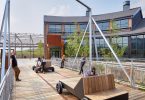A collaborative space to reuse materials, rebuild communities, and restore lives. Project RE’s mission is to reuse materials and facilitate landfill diversion; rebuild communities by strengthening the capacity of local residents, and restore lives by teaching people trade skills to secure a living wage. The 10,000 SF space in Pittsburgh’s East End includes a community room, design studio, gallery and workshops for wood, metal, masonry and digital fabrication. It is a partnership between the Urban Design Build Studio (UDBS) at world-renowned Carnegie Mellon University, the Trade Institute of Pittsburgh (TIP), and Construction Junction (CJ) – the latter being Pittsburgh’s first non-profit building material re-use retailer and a promoter of conservation through the re-use of building materials. The three non-profits are leveraging their assets to create an opportunity for prosperity by expanding knowledge and skill sets.
Smallman Galley is the nation’s first restaurant incubator, a food hall and a launch pad for the best new restaurant concepts in Pittsburgh. It cultivates and accelerates undiscovered chefs by providing a forum to showcase their capabilities, hone their craft, develop business acumen and build a following. The Smallman Galley concept was envisioned at sea by two Pittsburgh natives who careered as U.S. Navy Lieutenants: Tyler Benson and Ben Mantica. In traveling the world, they experienced grand food halls featuring the most unique culinary talent those nations had to offer. Smallman Galley was founded on the belief that talented Chefs here at home deserve a fair shot. With four fully outfitted kitchens and seats for 200 guests, Smallman Galley provides the infrastructure for chefs to bring their concepts to market at low-risk and for a low cost.
Tracey Evans, executive director, Wilkinsburg Community Development Corporation
Wilkinsburg is a historic community – a borough that is adjacent to the City of Pittsburgh. Like many urban communities – not only in the Pittsburgh region but across the nation – Wilkinsburg has seen a great decline in the last two decades, even though it is a neighbor to parts of Pittsburgh regarded for their affluence. A community with a curious history, Wilkinsburg is regaining traction because of the efforts of its native daughter, Tracey Evans, who helped to found the Wilkinsburg Community Development Corporation in 2007, becoming its first executive director. Wilkinsburg, where Evans continues to reside, has been a Strengthening Communities Partnership (SCP) community. SCP is a program of the Allegheny Conference on Community Development, one of the U.S.’s first public-private partnership organizations, and the organization that spearheaded the clean-up of Pittsburgh’s polluted air and water resources some 70 years ago.
In 2012, the Allegheny Conference on Community Development launched SCP to strengthen communities that had not fully shared in the Pittsburgh region’s economic transformation. The SCP makes long-term, positive impacts in participating communities by concentrating private investment through tax credits purchased by businesses in the PA Department of Community and Economic Development Neighborhood Partnership Program. These investments are complemented by targeted, pro bono professional services that will make redevelopment projects happen in these neighborhoods. Currently, seven regional communities are benefitting from SCP investments.
Urban Innovation21 is a unique public-private partnership that is supporting the growth of entrepreneurship in our region’s innovation economy and connecting that growth to underserved communities and the residents that live in them. These communities include the Uptown portion of the city of Pittsburgh and Homewood, a neighborhood in Pittsburgh’s East End and one of the poorest in the state. Keystone Innovation Zone programs in these two urban areas provide access to tax credits, business capital, paid internships and networking opportunities. One of Urban Innovation21’s most unique programs is the Pittsburgh Wealth-Building Initiative (PWBI).
The PWBI will catalyze the creation of employee-owned/community-based businesses in low-income neighborhoods enabling local residents to build wealth and income through the production and delivery of goods and services that meet the needs of area anchor institutions, as well as other customers. This Initiative will also implement the best workforce development models to create a successful pipeline to connect residents to the workforce of PWBI anchor institutions. The effort is being prototyped in Pittsburgh’s Hill District (adjacent to Uptown) and in Homewood with the aim of creating economic breakthroughs in these areas.
The organization’s president and CEO William Generett Jr., J.D., would make for a compelling interview.
Manchester Bidwell Corporation
Manchester Bidwell Corporation’s diverse programming combines to create empowering educational environments for adults-in-transition as well as urban and at-risk youth, enriching Southwestern Pennsylvania and, eventually, the world. Manchester Bidwell combines many seemingly disparate elements – adult career training, youth arts education, jazz presentation, orchid and floral sales – into a dynamic whole with a proven record of positively changing the lives of underserved populations in Pittsburgh and the surrounding region.
The organization originated when a young, disengaged African American man named Bill Strickland met Pittsburgh Public High School art teacher Frank Ross in the 1960s. Ross mentored Strickland throughout his teen years – impressing upon him the powers of art, education, and community – and helped him obtain admission to the University of Pittsburgh.
Wanting to give back to his struggling neighborhood, Strickland started a small ceramics program in the Manchester neighborhood of Pittsburgh – on the city’s North Side – in 1968. The Manchester Craftsmen’s Guild Youth & Arts program, as it is now called, serves public school students by offering courses in our ceramics, design, digital and photography studios. In 1972, Strickland assumed leadership of a struggling building trade school located near Manchester Craftsmen’s Guild (MCG). Over the years, Bidwell Training Center evolved to offer programs in fields ranging from horticulture to medical. Currently, it is a nationally accredited and state licensed adult career training institution.
President and CEO William E. Strickland, Jr., would provide an excellent interview. He is currently the chair of the Pennsylvania Economy League of Greater Pittsburgh, an affiliate of the Allegheny Conference providing thorough and documented research, analysis and recommendations on the pressing issues impacting regional and statewide competitiveness: the building blocks of sound public policy.
412 Food Rescue is the collaboration of two leading advocates in the region: Gisele Barreto-Fetterman and Leah Lizarondo – the former is the wife of John Fetterman, the famously unconventional and passionate mayor of disenfranchised Braddock, PA and now vying for a seat in the U.S. Senate. 412 Food Rescue works with food retailers, wholesalers, restaurants, caterers, universities and other food providers to rescue food that is perfectly good but that cannot be re-sold.
According to the organization, 40% of all food is wasted. This translates to 20 pounds of food per person per month worth $165 billion a year. The National Resources Defense Council reports that over 50% of produce and almost 40% of grains are wasted. 412 Food Rescue aims to address this disconnect in supply and access by rescuing food and directly distributing to communities in need.
The program, as well as its founders – Fetterman and Lizarondo – are illustrative of rejuvenating and revitalizing parts of the city of Pittsburgh, along with people in those parts, who have been left behind and have not fully experienced the vitality brought about by the region’s transformation.
Public and private sector partnerships and investments have led to the repurposing of a former and behemoth Pittsburgh Public Schools vocational-technical high school (Connelly Trade School) in the Hill District of Pittsburgh as the new Energy Innovation Center (EIC). Uniquely wrapping green technologies around STEM education, the EIC aims to align workforce development and education, develop and demonstrate technology and incubate businesses to support emerging clean and sustainable energy markets. With energy – traditional and non-traditional – being a core part of the Pittsburgh region’s past, present, and future, the education, and training underway at the EIC will strengthen Pittsburgh’s opportunity to be a model for the U.S. and beyond.
Pittsburgh is – as it has been dubbed by one international journalist visiting us – “a big, small city.” As such, we believe we are “right-sized” to continue making meaningful rejuvenation and revitalization happen here.
###
Contact: Phil Cynar | Allegheny Conference on Community Development | 412-281-4783, ext. 4573 | pcynar@alleghenyconference.org







